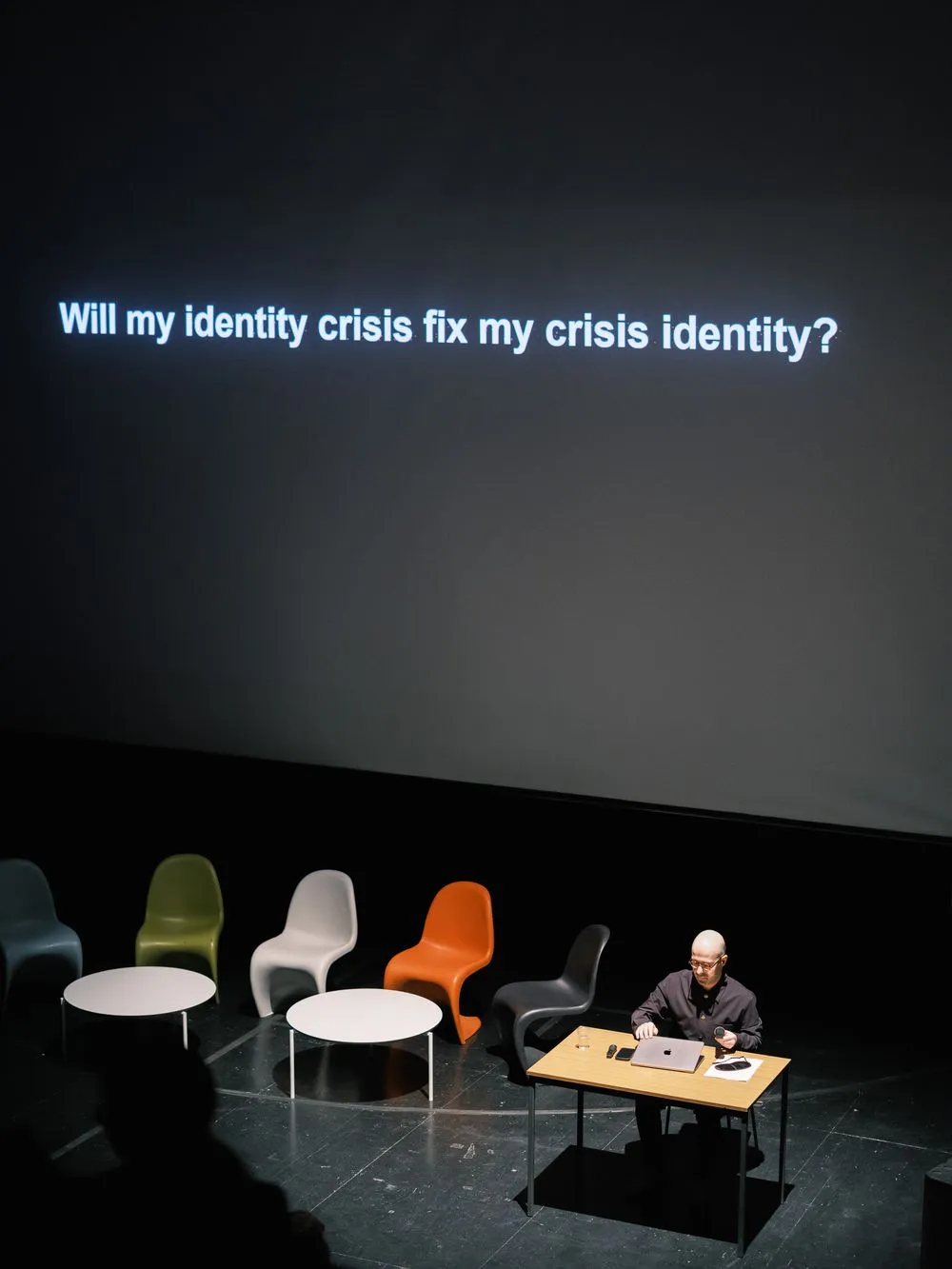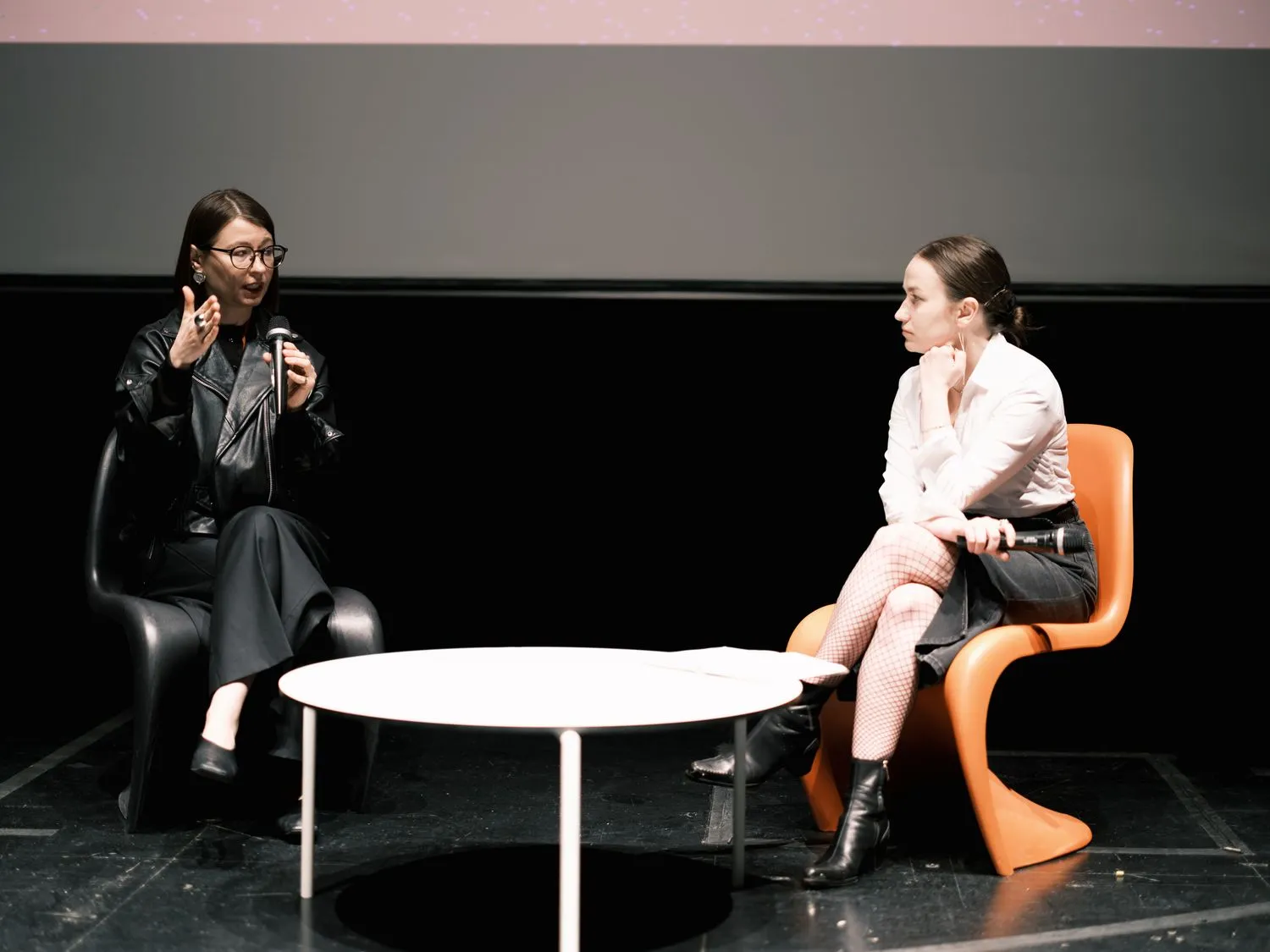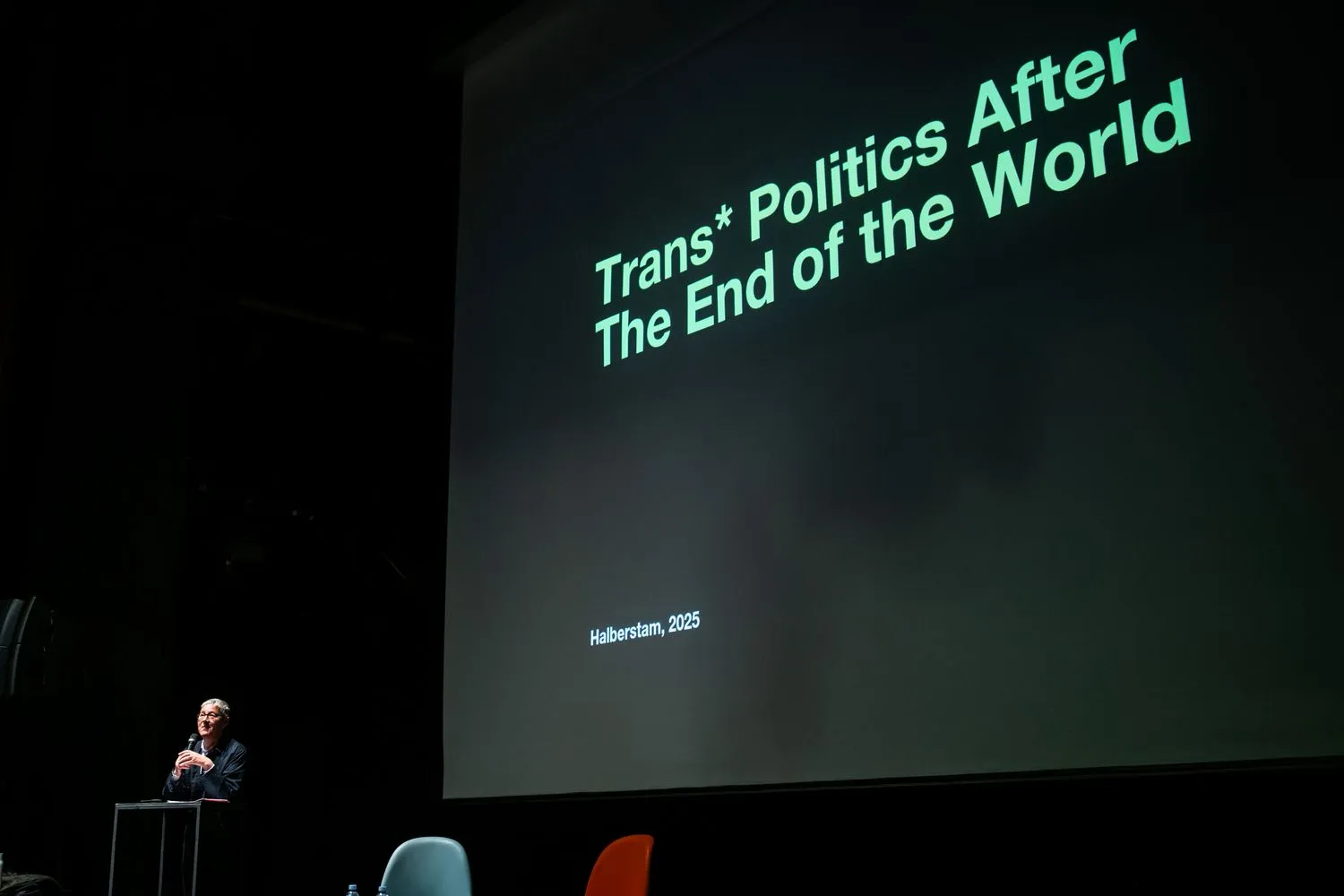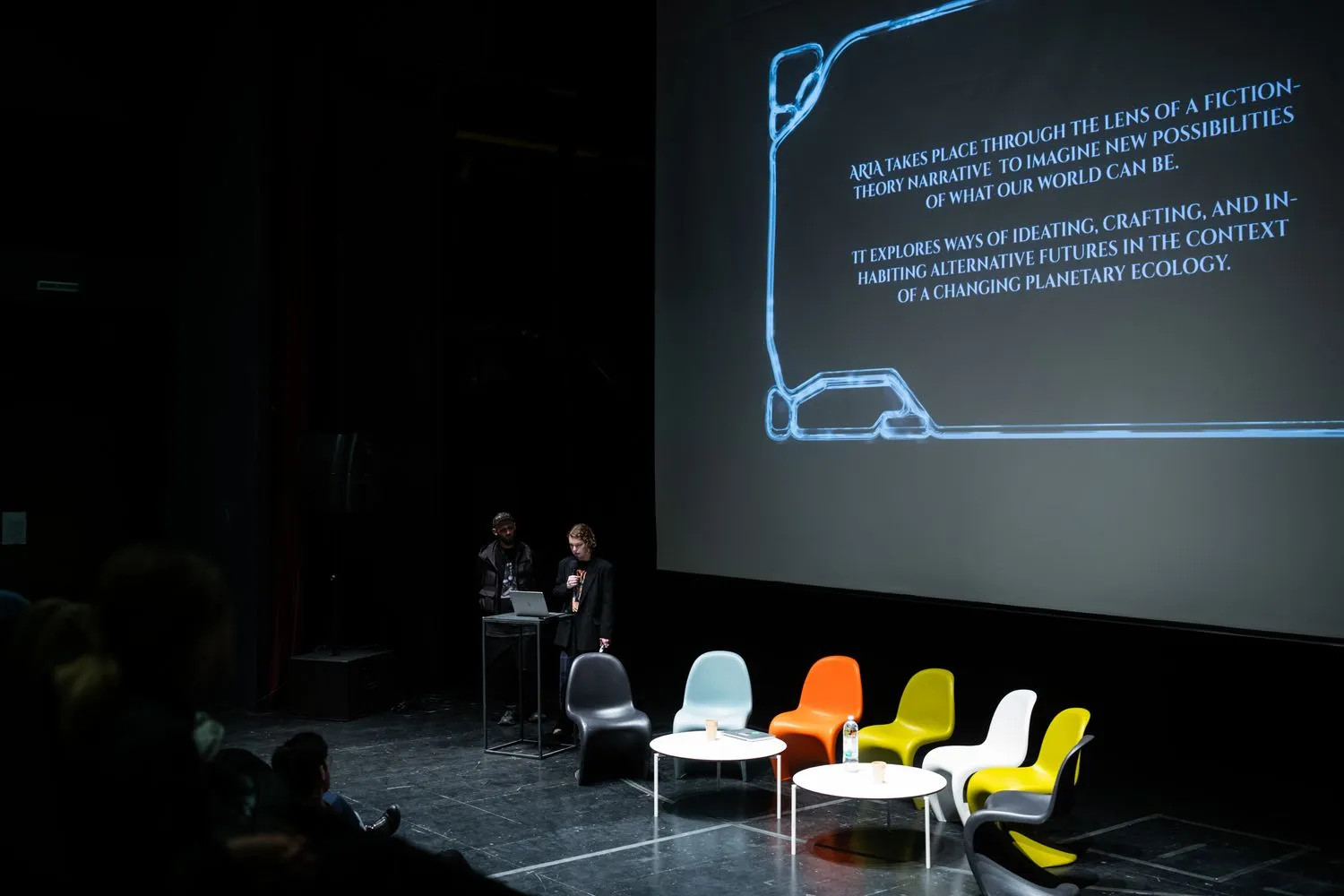 Phoenix Keepers worlding session. Worlds' End Hackathon by OMSK Social Club, 2024. Commissioned by ARIA. Photography by Jonas Schoeneberg.
Phoenix Keepers worlding session. Worlds' End Hackathon by OMSK Social Club, 2024. Commissioned by ARIA. Photography by Jonas Schoeneberg. How to listen to anything after Svitlana Matviyenko's lecture on the production of terror environments — that was my main question after the first block of panels at Identity Crisis Network's conference in Zagreb. It is impossible to speak of war if you are not the subject of war, Svitlana concluded during the Q&A session, delivering one of the most vital things to remember about our contemporary condition. This is not to say that we shouldn't speak out — because we should, but that we cannot truly understand the experience of terror, without living it.
The conference took place at the Museum of Contemporary Art, and its intention was to dismantle the titular issue of the network across two days, with a list of speakers from various backgrounds. At a place made for discussion about identity, the unfathomable shift that happens to a person during war overbears the gravity of any other open questions, if only for a short while — calling Adorno's view on creation after Auschwitz to mind.
I was wondering if this is to say that identity crisis is a term reserved for the privileged, or that, as Bill Balaskas has noted in his opening lecture, crisis has become an identity. The identity of crisis is sometimes forced on people — who have no choice but to endure, fight back or die, and sometimes it seems to be a choice, one that is certainly not made randomly, but in correspondence with the impossibility to respond to the complexity of the world.


On and offline, the ghost of our "fucked up world" plays the main role in our daily talks and debates. There is not a single table that I sit at, that doesn't end up a platform for political discourse, repeatedly mentioning the usual oligarchs, as well as an unknown presence of "something that is not quite right". This was heard throughout Scott Wark's speculation on how the digital world is, in fact, already a comprehensive, eerie representation of our collective identity — if we acknowledge that by "our" and "collective" we agree to the terms of no world without the online world.
This is what Anna Longo seemed to firmly imply in her concluding lecture: that we are our own brand — as Naomi Klein argued in No Logo (1999) — and that our identity is constantly performed. But I wonder, what happens if we change some perspective, and the beholder of identity is no longer… Instagram?

Somewhere along those lines, I came to understand what Jack Halberstam was saying the day before, resonating with my own research to an extent. Departing, beautifully, from the materially evasive art of Gordon Matta-Clark, Jack arrives at the concrete idea of becoming uninteresting to the system. Our identity should, in fact, not be marketable — countering Anna Longo's dystopian view, we do not necessarily have to be a brand; we might as well have the option to be free. To take something from my own writing —because why not, if this is anyway about self-branding as a possibility — what the capitalist eye cannot see, it cannot devour.
I would be eager to explore continuous performance as survival strategy, while appreciating that the word "performance" has many different interpretations, depending on which school of thought you consult. In other words, to perform an identity might be a great way to avoid being perceived all together. This can be seen very primitively, in the fundamental sense of the word, as the freedom to lie, even if this is ethically wrong or, as Longo insists, the algorithm sees right through it. But on the other hand, performing can take many other shapes and produce an identity that outsmarts the beholder, the interlocutor, or whoever we decide is reflecting ourselves back to us.
In conversation with another panelist, Darko Vukić, I was called to consider a counterargument: that capitalism is interested precisely in that which pertains to stay invisible, a thought that might originate in his own view of the unborn as a placeholder for the delayed symbolic. My initial argument remains as an open question: what are the forms of existing that are truly unknown to any known structure, territories that exist outside of any map, something comparable to what Badiou would call poetry, which is not even unborn but whose creation resists preconception?

This finally brings me to the part of the conference which intrigued me most, but time did not allow for a comprehensive overview. Tjaša Pogačar and Brandon Rosenbluth presented their experience with ARIA (Algo-Rhythmic Ideation Assembly), a summer school that uses role-play as method. What happens when you wake up and have to pretend from the beginning of the day, that you are someone else, as indicated by the rules of the game?
Tjaša commented on skipping in and out of the "magic circle" — a term used to describe the temporary space where the rules of a game apply, distinct from everyday reality — being both the school host and a workshop participant, noting how her sense of self seemed to deteriorate at times. This made me think about mental illness as a field that felt slightly left out on the occasion of this conference, a missed opportunity to discuss the perception of surrealism as part of our reality. Could that be the ungraspable "something" that is wrong in the world — skipping between the magic circles of alternating game-masters while insisting on sanity? A split, schizophrenic or depressed personality would definitely have something to say about identity crisis. I hope to hear more about it next time.
The conference was organized by Identity Crisis Network — comprised of Luka Cvetković, Klara Petrović, Michalina Sablik, Luja Šimunović and Vera Zalutskaya — in collaboration with Adam Mickiewicz Institute. The conference speaker list included: Bill Balaskas, Suzana Milevska, Mark Cinkevich, Ying Sze Pek, Svitlana Matviyenko, Salim Bayri, Agata Wieczorek, Simon(e) van Saarloos, Hana Janečkova, Jack Halberstam, Marten Spangberg, Mohammad Salemy, Darko Vukić, Boris Ondreička, Simon O'Sullivan, Klara Kofen, Tjaša Pogačar and Brandon Rosenbluth, Scott Wark, Xtreme Girl and Anna Longo.